Report: Organisational Learning and a Learning Organisation Analysis
VerifiedAdded on 2022/11/23
|13
|3311
|354
Report
AI Summary
This report provides a critical evaluation of the differences between organizational learning and a learning organization. It begins with an introduction to both concepts, defining organizational learning as the process of acquiring and transferring knowledge, often through experience, and a learning organization as one that emphasizes employee skill and capability enhancement. The report uses Tesco as a case study to illustrate these concepts, including an overview of Tesco's structure and operations. It delves into various types of organizational learning, such as double-loop and single-loop learning, as well as the learning communities within an organization. The report then explores the characteristics of a learning organization, including personal mastery, team learning, mental models, shared vision, and systems thinking. The core difference is highlighted: organizational learning focuses on learning through experience, while a learning organization emphasizes employee skill and capability enhancement. The report concludes by summarizing the benefits of both approaches for organizational growth and competitiveness.
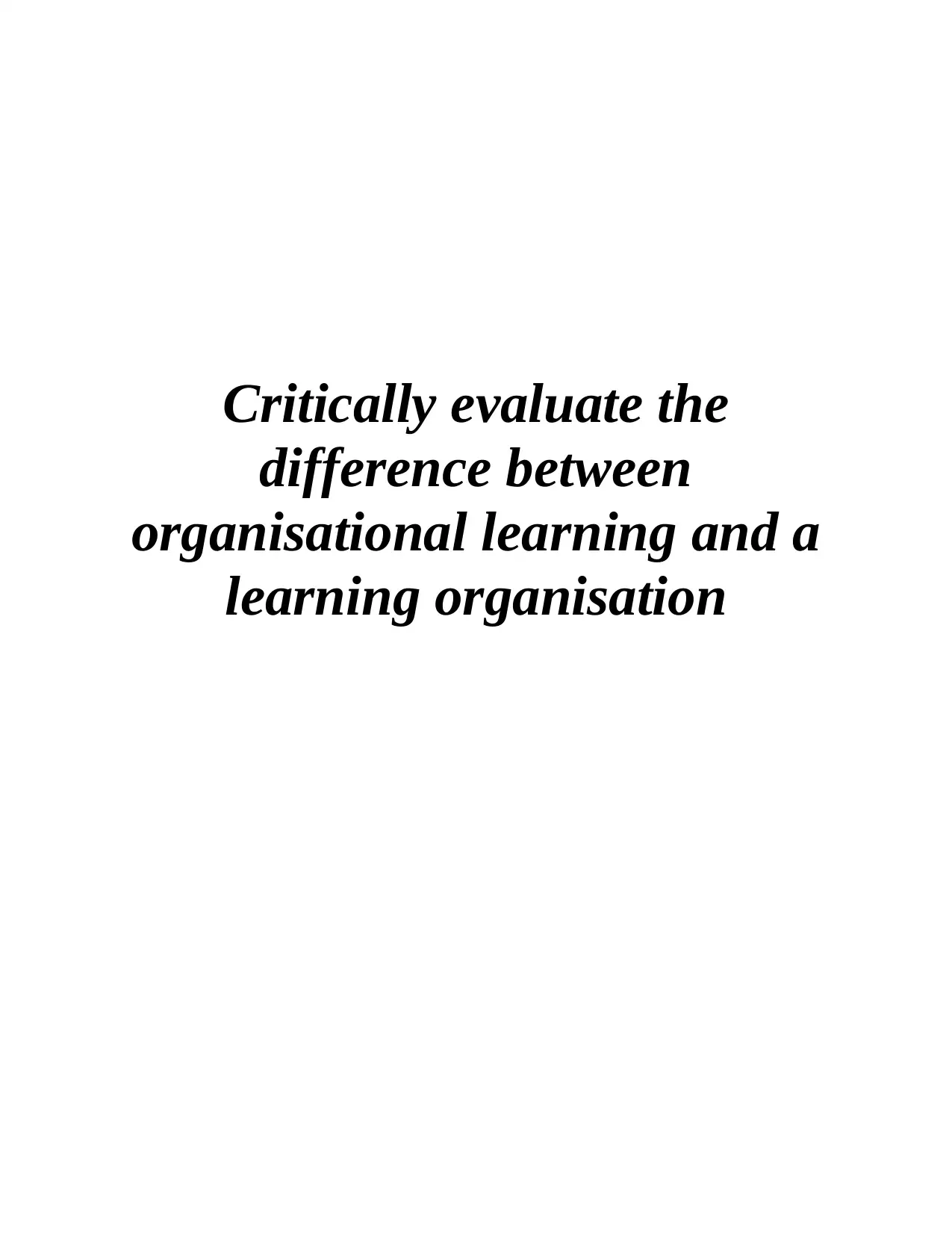
Critically evaluate the
difference between
organisational learning and a
learning organisation
difference between
organisational learning and a
learning organisation
Paraphrase This Document
Need a fresh take? Get an instant paraphrase of this document with our AI Paraphraser
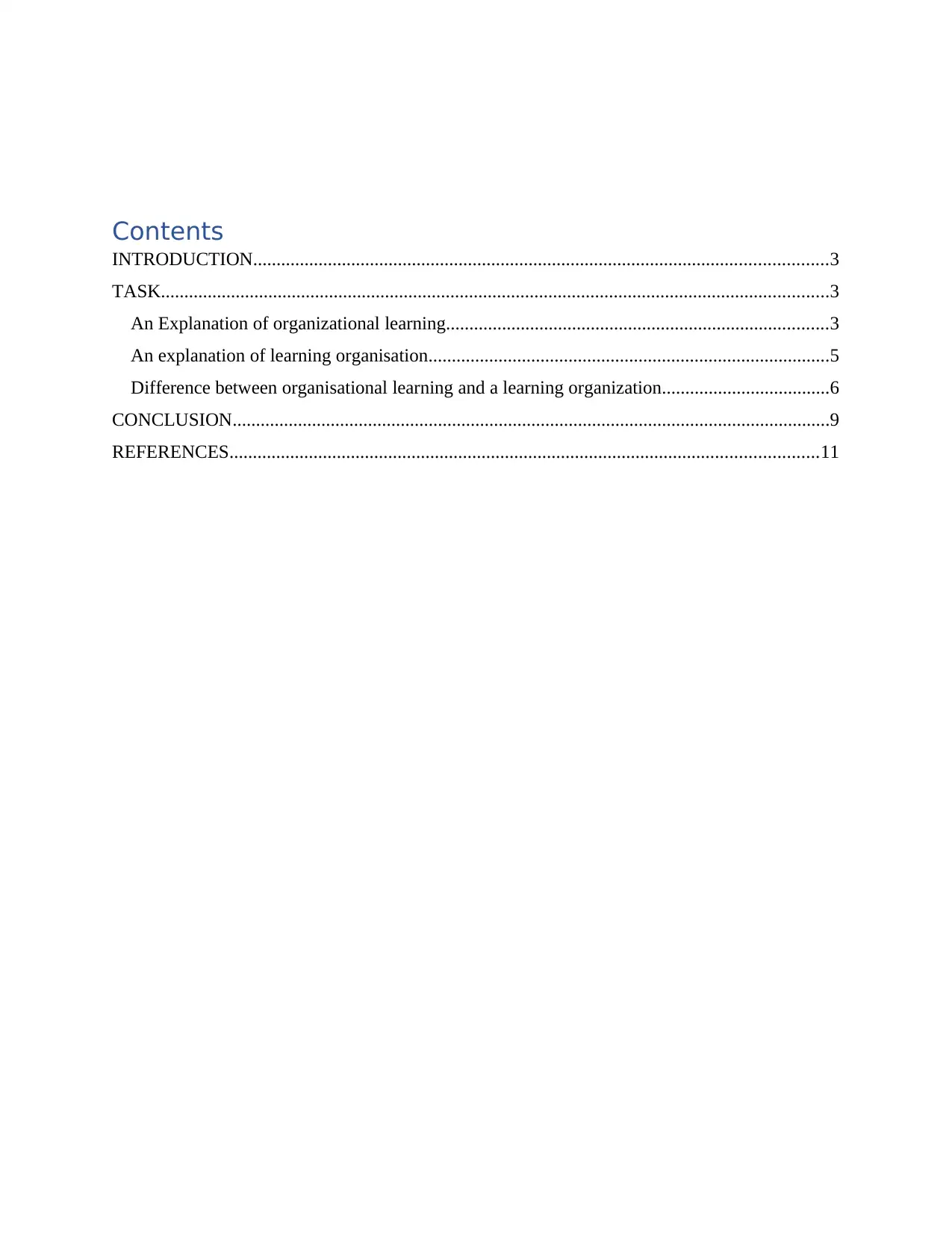
Contents
INTRODUCTION...........................................................................................................................3
TASK...............................................................................................................................................3
An Explanation of organizational learning..................................................................................3
An explanation of learning organisation......................................................................................5
Difference between organisational learning and a learning organization....................................6
CONCLUSION................................................................................................................................9
REFERENCES..............................................................................................................................11
INTRODUCTION...........................................................................................................................3
TASK...............................................................................................................................................3
An Explanation of organizational learning..................................................................................3
An explanation of learning organisation......................................................................................5
Difference between organisational learning and a learning organization....................................6
CONCLUSION................................................................................................................................9
REFERENCES..............................................................................................................................11
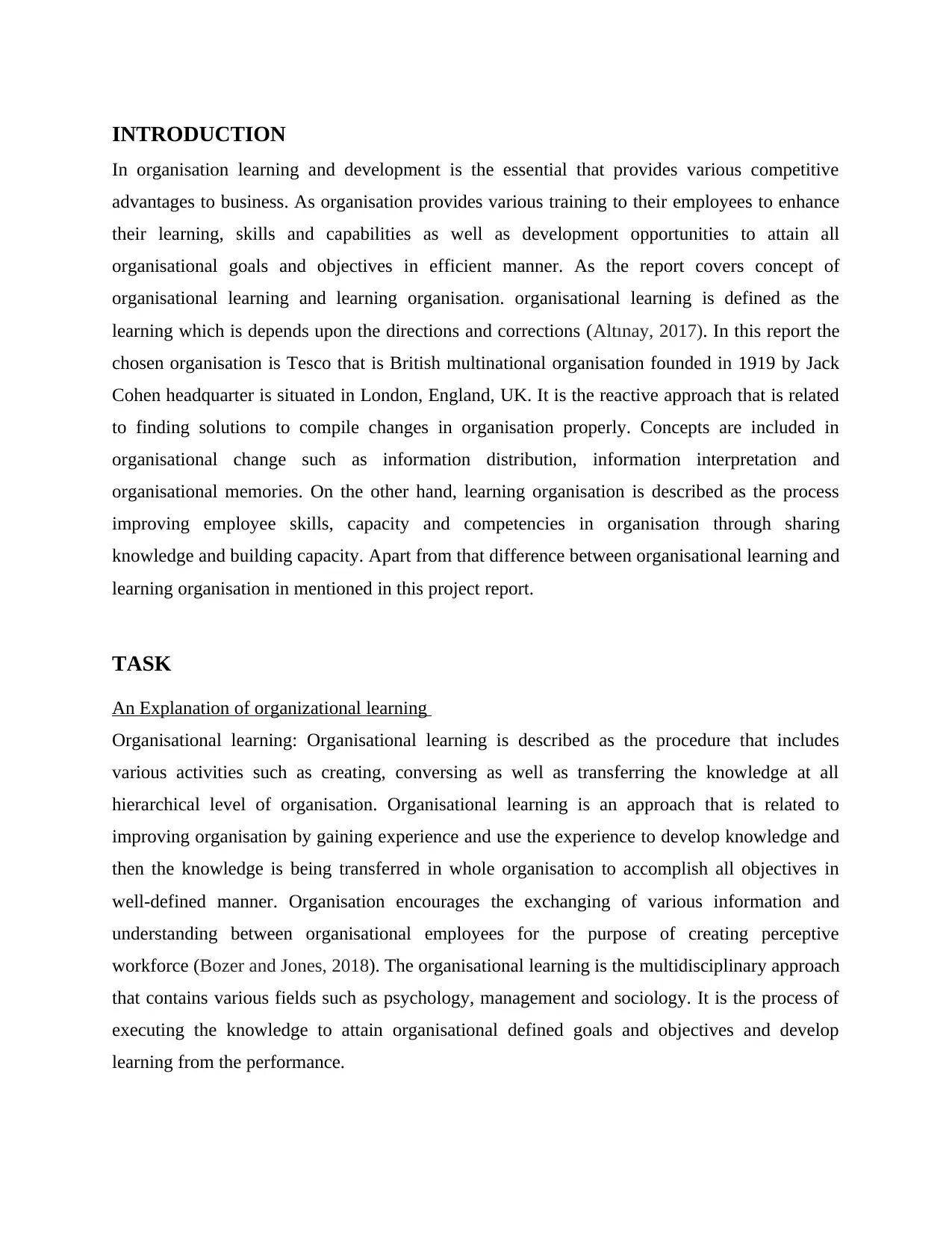
INTRODUCTION
In organisation learning and development is the essential that provides various competitive
advantages to business. As organisation provides various training to their employees to enhance
their learning, skills and capabilities as well as development opportunities to attain all
organisational goals and objectives in efficient manner. As the report covers concept of
organisational learning and learning organisation. organisational learning is defined as the
learning which is depends upon the directions and corrections (Altınay, 2017). In this report the
chosen organisation is Tesco that is British multinational organisation founded in 1919 by Jack
Cohen headquarter is situated in London, England, UK. It is the reactive approach that is related
to finding solutions to compile changes in organisation properly. Concepts are included in
organisational change such as information distribution, information interpretation and
organisational memories. On the other hand, learning organisation is described as the process
improving employee skills, capacity and competencies in organisation through sharing
knowledge and building capacity. Apart from that difference between organisational learning and
learning organisation in mentioned in this project report.
TASK
An Explanation of organizational learning
Organisational learning: Organisational learning is described as the procedure that includes
various activities such as creating, conversing as well as transferring the knowledge at all
hierarchical level of organisation. Organisational learning is an approach that is related to
improving organisation by gaining experience and use the experience to develop knowledge and
then the knowledge is being transferred in whole organisation to accomplish all objectives in
well-defined manner. Organisation encourages the exchanging of various information and
understanding between organisational employees for the purpose of creating perceptive
workforce (Bozer and Jones, 2018). The organisational learning is the multidisciplinary approach
that contains various fields such as psychology, management and sociology. It is the process of
executing the knowledge to attain organisational defined goals and objectives and develop
learning from the performance.
In organisation learning and development is the essential that provides various competitive
advantages to business. As organisation provides various training to their employees to enhance
their learning, skills and capabilities as well as development opportunities to attain all
organisational goals and objectives in efficient manner. As the report covers concept of
organisational learning and learning organisation. organisational learning is defined as the
learning which is depends upon the directions and corrections (Altınay, 2017). In this report the
chosen organisation is Tesco that is British multinational organisation founded in 1919 by Jack
Cohen headquarter is situated in London, England, UK. It is the reactive approach that is related
to finding solutions to compile changes in organisation properly. Concepts are included in
organisational change such as information distribution, information interpretation and
organisational memories. On the other hand, learning organisation is described as the process
improving employee skills, capacity and competencies in organisation through sharing
knowledge and building capacity. Apart from that difference between organisational learning and
learning organisation in mentioned in this project report.
TASK
An Explanation of organizational learning
Organisational learning: Organisational learning is described as the procedure that includes
various activities such as creating, conversing as well as transferring the knowledge at all
hierarchical level of organisation. Organisational learning is an approach that is related to
improving organisation by gaining experience and use the experience to develop knowledge and
then the knowledge is being transferred in whole organisation to accomplish all objectives in
well-defined manner. Organisation encourages the exchanging of various information and
understanding between organisational employees for the purpose of creating perceptive
workforce (Bozer and Jones, 2018). The organisational learning is the multidisciplinary approach
that contains various fields such as psychology, management and sociology. It is the process of
executing the knowledge to attain organisational defined goals and objectives and develop
learning from the performance.
⊘ This is a preview!⊘
Do you want full access?
Subscribe today to unlock all pages.

Trusted by 1+ million students worldwide
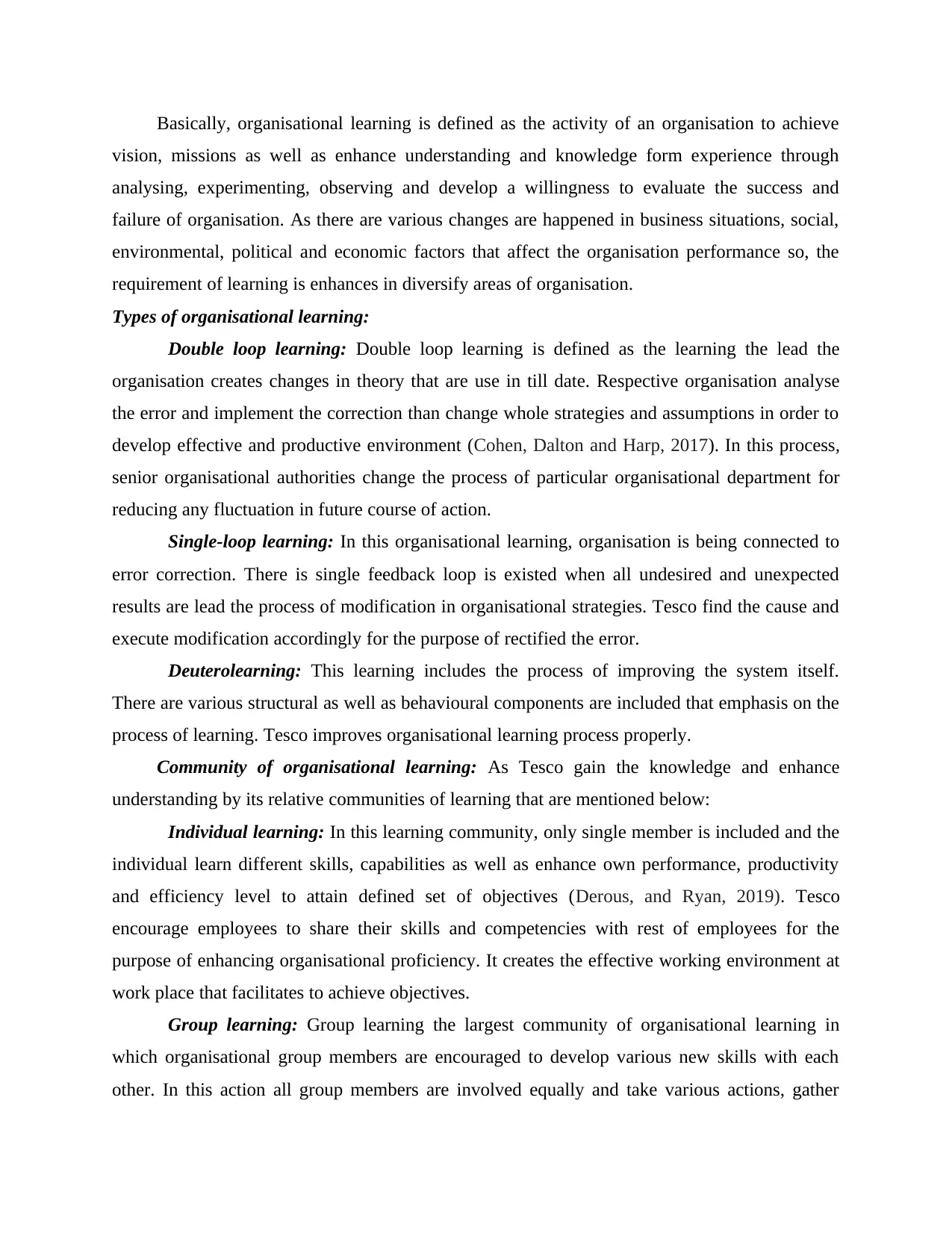
Basically, organisational learning is defined as the activity of an organisation to achieve
vision, missions as well as enhance understanding and knowledge form experience through
analysing, experimenting, observing and develop a willingness to evaluate the success and
failure of organisation. As there are various changes are happened in business situations, social,
environmental, political and economic factors that affect the organisation performance so, the
requirement of learning is enhances in diversify areas of organisation.
Types of organisational learning:
Double loop learning: Double loop learning is defined as the learning the lead the
organisation creates changes in theory that are use in till date. Respective organisation analyse
the error and implement the correction than change whole strategies and assumptions in order to
develop effective and productive environment (Cohen, Dalton and Harp, 2017). In this process,
senior organisational authorities change the process of particular organisational department for
reducing any fluctuation in future course of action.
Single-loop learning: In this organisational learning, organisation is being connected to
error correction. There is single feedback loop is existed when all undesired and unexpected
results are lead the process of modification in organisational strategies. Tesco find the cause and
execute modification accordingly for the purpose of rectified the error.
Deuterolearning: This learning includes the process of improving the system itself.
There are various structural as well as behavioural components are included that emphasis on the
process of learning. Tesco improves organisational learning process properly.
Community of organisational learning: As Tesco gain the knowledge and enhance
understanding by its relative communities of learning that are mentioned below:
Individual learning: In this learning community, only single member is included and the
individual learn different skills, capabilities as well as enhance own performance, productivity
and efficiency level to attain defined set of objectives (Derous, and Ryan, 2019). Tesco
encourage employees to share their skills and competencies with rest of employees for the
purpose of enhancing organisational proficiency. It creates the effective working environment at
work place that facilitates to achieve objectives.
Group learning: Group learning the largest community of organisational learning in
which organisational group members are encouraged to develop various new skills with each
other. In this action all group members are involved equally and take various actions, gather
vision, missions as well as enhance understanding and knowledge form experience through
analysing, experimenting, observing and develop a willingness to evaluate the success and
failure of organisation. As there are various changes are happened in business situations, social,
environmental, political and economic factors that affect the organisation performance so, the
requirement of learning is enhances in diversify areas of organisation.
Types of organisational learning:
Double loop learning: Double loop learning is defined as the learning the lead the
organisation creates changes in theory that are use in till date. Respective organisation analyse
the error and implement the correction than change whole strategies and assumptions in order to
develop effective and productive environment (Cohen, Dalton and Harp, 2017). In this process,
senior organisational authorities change the process of particular organisational department for
reducing any fluctuation in future course of action.
Single-loop learning: In this organisational learning, organisation is being connected to
error correction. There is single feedback loop is existed when all undesired and unexpected
results are lead the process of modification in organisational strategies. Tesco find the cause and
execute modification accordingly for the purpose of rectified the error.
Deuterolearning: This learning includes the process of improving the system itself.
There are various structural as well as behavioural components are included that emphasis on the
process of learning. Tesco improves organisational learning process properly.
Community of organisational learning: As Tesco gain the knowledge and enhance
understanding by its relative communities of learning that are mentioned below:
Individual learning: In this learning community, only single member is included and the
individual learn different skills, capabilities as well as enhance own performance, productivity
and efficiency level to attain defined set of objectives (Derous, and Ryan, 2019). Tesco
encourage employees to share their skills and competencies with rest of employees for the
purpose of enhancing organisational proficiency. It creates the effective working environment at
work place that facilitates to achieve objectives.
Group learning: Group learning the largest community of organisational learning in
which organisational group members are encouraged to develop various new skills with each
other. In this action all group members are involved equally and take various actions, gather
Paraphrase This Document
Need a fresh take? Get an instant paraphrase of this document with our AI Paraphraser
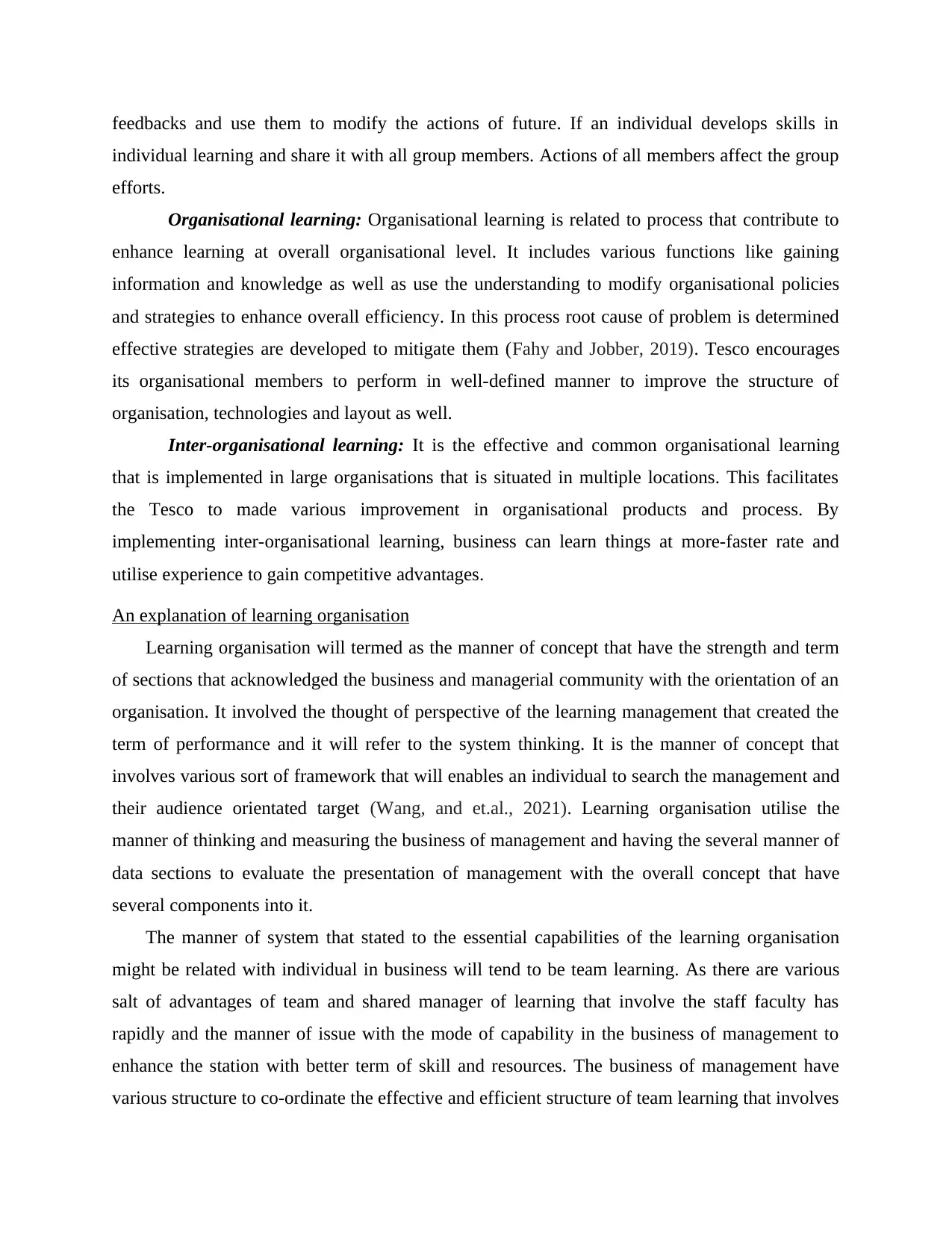
feedbacks and use them to modify the actions of future. If an individual develops skills in
individual learning and share it with all group members. Actions of all members affect the group
efforts.
Organisational learning: Organisational learning is related to process that contribute to
enhance learning at overall organisational level. It includes various functions like gaining
information and knowledge as well as use the understanding to modify organisational policies
and strategies to enhance overall efficiency. In this process root cause of problem is determined
effective strategies are developed to mitigate them (Fahy and Jobber, 2019). Tesco encourages
its organisational members to perform in well-defined manner to improve the structure of
organisation, technologies and layout as well.
Inter-organisational learning: It is the effective and common organisational learning
that is implemented in large organisations that is situated in multiple locations. This facilitates
the Tesco to made various improvement in organisational products and process. By
implementing inter-organisational learning, business can learn things at more-faster rate and
utilise experience to gain competitive advantages.
An explanation of learning organisation
Learning organisation will termed as the manner of concept that have the strength and term
of sections that acknowledged the business and managerial community with the orientation of an
organisation. It involved the thought of perspective of the learning management that created the
term of performance and it will refer to the system thinking. It is the manner of concept that
involves various sort of framework that will enables an individual to search the management and
their audience orientated target (Wang, and et.al., 2021). Learning organisation utilise the
manner of thinking and measuring the business of management and having the several manner of
data sections to evaluate the presentation of management with the overall concept that have
several components into it.
The manner of system that stated to the essential capabilities of the learning organisation
might be related with individual in business will tend to be team learning. As there are various
salt of advantages of team and shared manager of learning that involve the staff faculty has
rapidly and the manner of issue with the mode of capability in the business of management to
enhance the station with better term of skill and resources. The business of management have
various structure to co-ordinate the effective and efficient structure of team learning that involves
individual learning and share it with all group members. Actions of all members affect the group
efforts.
Organisational learning: Organisational learning is related to process that contribute to
enhance learning at overall organisational level. It includes various functions like gaining
information and knowledge as well as use the understanding to modify organisational policies
and strategies to enhance overall efficiency. In this process root cause of problem is determined
effective strategies are developed to mitigate them (Fahy and Jobber, 2019). Tesco encourages
its organisational members to perform in well-defined manner to improve the structure of
organisation, technologies and layout as well.
Inter-organisational learning: It is the effective and common organisational learning
that is implemented in large organisations that is situated in multiple locations. This facilitates
the Tesco to made various improvement in organisational products and process. By
implementing inter-organisational learning, business can learn things at more-faster rate and
utilise experience to gain competitive advantages.
An explanation of learning organisation
Learning organisation will termed as the manner of concept that have the strength and term
of sections that acknowledged the business and managerial community with the orientation of an
organisation. It involved the thought of perspective of the learning management that created the
term of performance and it will refer to the system thinking. It is the manner of concept that
involves various sort of framework that will enables an individual to search the management and
their audience orientated target (Wang, and et.al., 2021). Learning organisation utilise the
manner of thinking and measuring the business of management and having the several manner of
data sections to evaluate the presentation of management with the overall concept that have
several components into it.
The manner of system that stated to the essential capabilities of the learning organisation
might be related with individual in business will tend to be team learning. As there are various
salt of advantages of team and shared manager of learning that involve the staff faculty has
rapidly and the manner of issue with the mode of capability in the business of management to
enhance the station with better term of skill and resources. The business of management have
various structure to co-ordinate the effective and efficient structure of team learning that involves
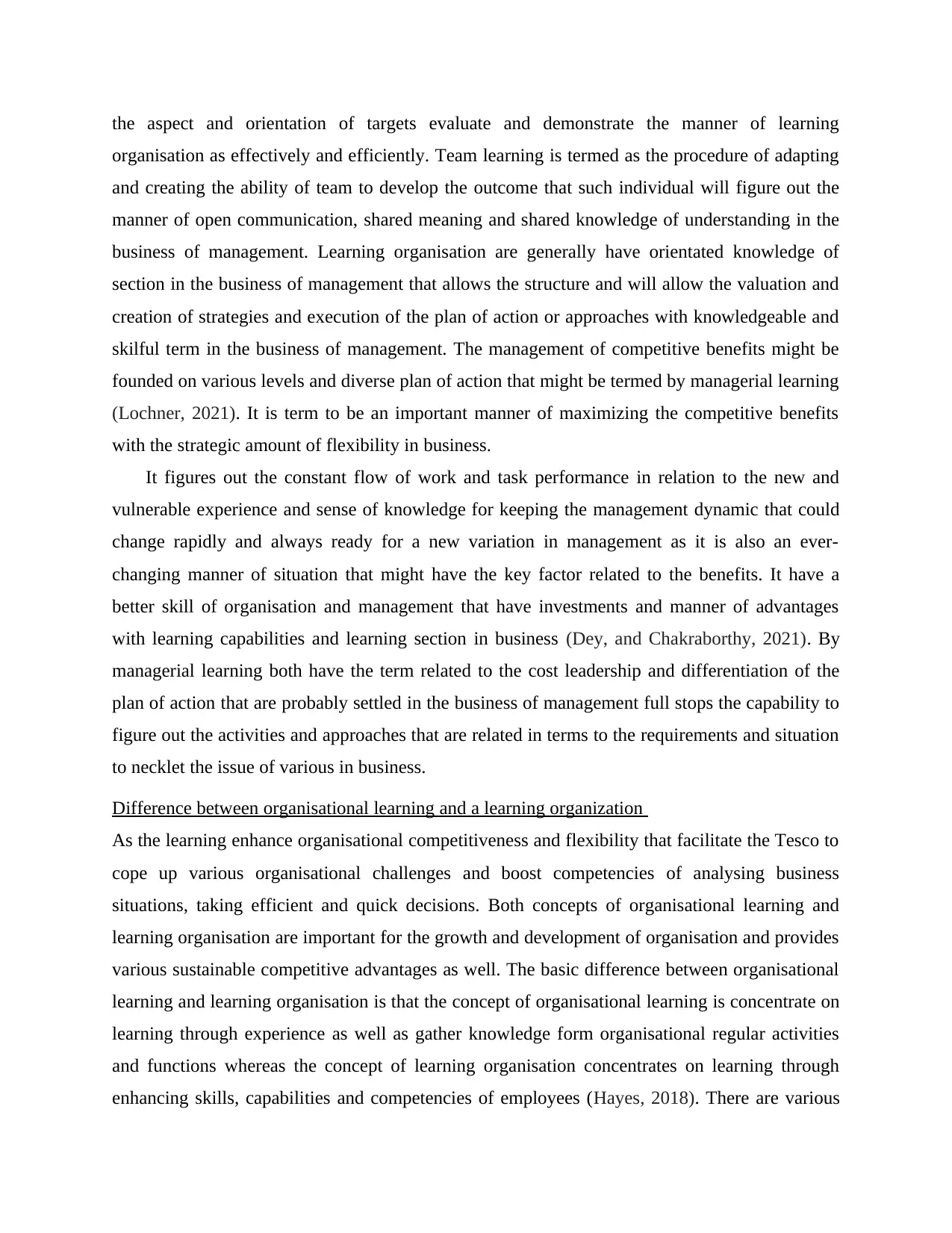
the aspect and orientation of targets evaluate and demonstrate the manner of learning
organisation as effectively and efficiently. Team learning is termed as the procedure of adapting
and creating the ability of team to develop the outcome that such individual will figure out the
manner of open communication, shared meaning and shared knowledge of understanding in the
business of management. Learning organisation are generally have orientated knowledge of
section in the business of management that allows the structure and will allow the valuation and
creation of strategies and execution of the plan of action or approaches with knowledgeable and
skilful term in the business of management. The management of competitive benefits might be
founded on various levels and diverse plan of action that might be termed by managerial learning
(Lochner, 2021). It is term to be an important manner of maximizing the competitive benefits
with the strategic amount of flexibility in business.
It figures out the constant flow of work and task performance in relation to the new and
vulnerable experience and sense of knowledge for keeping the management dynamic that could
change rapidly and always ready for a new variation in management as it is also an ever-
changing manner of situation that might have the key factor related to the benefits. It have a
better skill of organisation and management that have investments and manner of advantages
with learning capabilities and learning section in business (Dey, and Chakraborthy, 2021). By
managerial learning both have the term related to the cost leadership and differentiation of the
plan of action that are probably settled in the business of management full stops the capability to
figure out the activities and approaches that are related in terms to the requirements and situation
to necklet the issue of various in business.
Difference between organisational learning and a learning organization
As the learning enhance organisational competitiveness and flexibility that facilitate the Tesco to
cope up various organisational challenges and boost competencies of analysing business
situations, taking efficient and quick decisions. Both concepts of organisational learning and
learning organisation are important for the growth and development of organisation and provides
various sustainable competitive advantages as well. The basic difference between organisational
learning and learning organisation is that the concept of organisational learning is concentrate on
learning through experience as well as gather knowledge form organisational regular activities
and functions whereas the concept of learning organisation concentrates on learning through
enhancing skills, capabilities and competencies of employees (Hayes, 2018). There are various
organisation as effectively and efficiently. Team learning is termed as the procedure of adapting
and creating the ability of team to develop the outcome that such individual will figure out the
manner of open communication, shared meaning and shared knowledge of understanding in the
business of management. Learning organisation are generally have orientated knowledge of
section in the business of management that allows the structure and will allow the valuation and
creation of strategies and execution of the plan of action or approaches with knowledgeable and
skilful term in the business of management. The management of competitive benefits might be
founded on various levels and diverse plan of action that might be termed by managerial learning
(Lochner, 2021). It is term to be an important manner of maximizing the competitive benefits
with the strategic amount of flexibility in business.
It figures out the constant flow of work and task performance in relation to the new and
vulnerable experience and sense of knowledge for keeping the management dynamic that could
change rapidly and always ready for a new variation in management as it is also an ever-
changing manner of situation that might have the key factor related to the benefits. It have a
better skill of organisation and management that have investments and manner of advantages
with learning capabilities and learning section in business (Dey, and Chakraborthy, 2021). By
managerial learning both have the term related to the cost leadership and differentiation of the
plan of action that are probably settled in the business of management full stops the capability to
figure out the activities and approaches that are related in terms to the requirements and situation
to necklet the issue of various in business.
Difference between organisational learning and a learning organization
As the learning enhance organisational competitiveness and flexibility that facilitate the Tesco to
cope up various organisational challenges and boost competencies of analysing business
situations, taking efficient and quick decisions. Both concepts of organisational learning and
learning organisation are important for the growth and development of organisation and provides
various sustainable competitive advantages as well. The basic difference between organisational
learning and learning organisation is that the concept of organisational learning is concentrate on
learning through experience as well as gather knowledge form organisational regular activities
and functions whereas the concept of learning organisation concentrates on learning through
enhancing skills, capabilities and competencies of employees (Hayes, 2018). There are various
⊘ This is a preview!⊘
Do you want full access?
Subscribe today to unlock all pages.

Trusted by 1+ million students worldwide
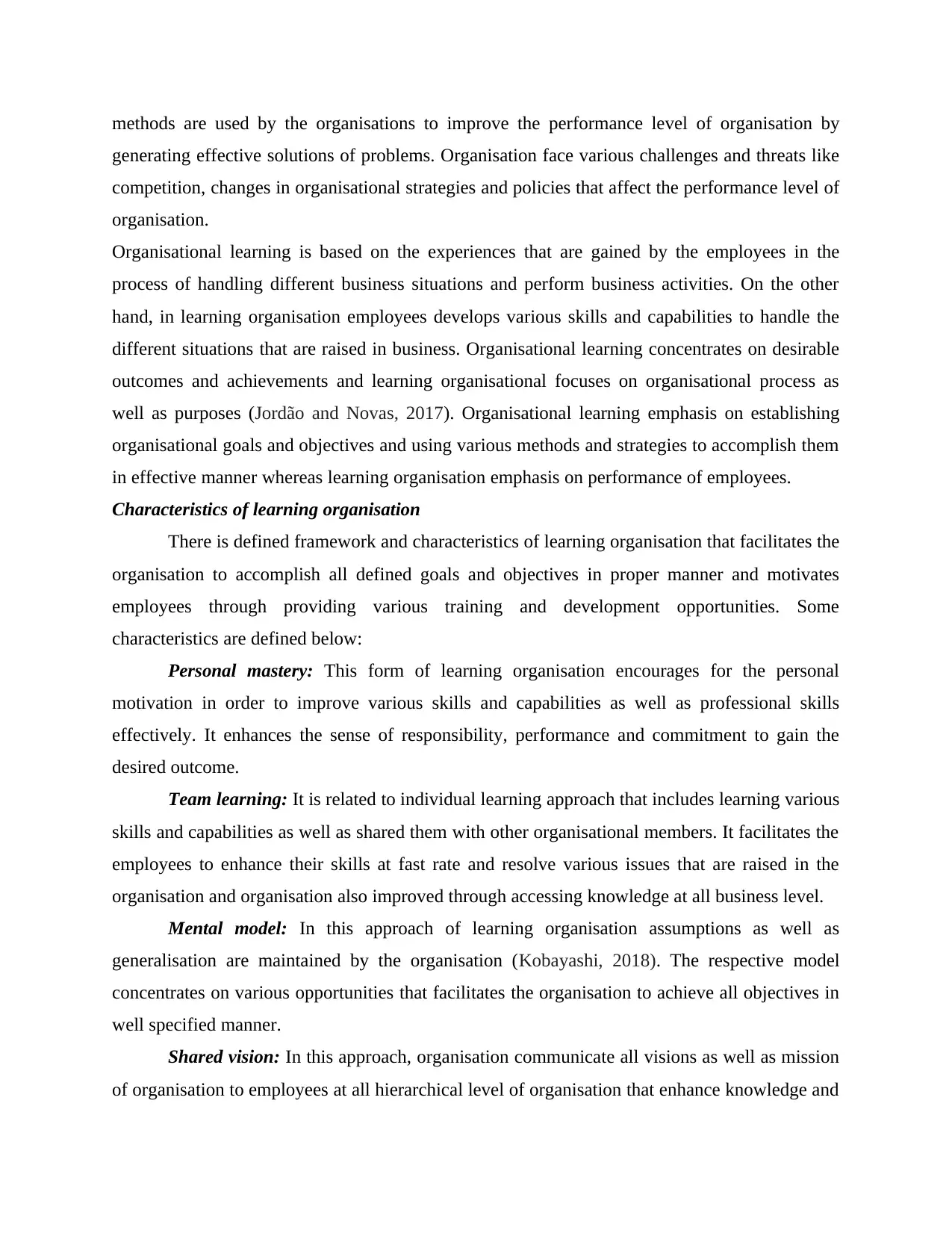
methods are used by the organisations to improve the performance level of organisation by
generating effective solutions of problems. Organisation face various challenges and threats like
competition, changes in organisational strategies and policies that affect the performance level of
organisation.
Organisational learning is based on the experiences that are gained by the employees in the
process of handling different business situations and perform business activities. On the other
hand, in learning organisation employees develops various skills and capabilities to handle the
different situations that are raised in business. Organisational learning concentrates on desirable
outcomes and achievements and learning organisational focuses on organisational process as
well as purposes (Jordão and Novas, 2017). Organisational learning emphasis on establishing
organisational goals and objectives and using various methods and strategies to accomplish them
in effective manner whereas learning organisation emphasis on performance of employees.
Characteristics of learning organisation
There is defined framework and characteristics of learning organisation that facilitates the
organisation to accomplish all defined goals and objectives in proper manner and motivates
employees through providing various training and development opportunities. Some
characteristics are defined below:
Personal mastery: This form of learning organisation encourages for the personal
motivation in order to improve various skills and capabilities as well as professional skills
effectively. It enhances the sense of responsibility, performance and commitment to gain the
desired outcome.
Team learning: It is related to individual learning approach that includes learning various
skills and capabilities as well as shared them with other organisational members. It facilitates the
employees to enhance their skills at fast rate and resolve various issues that are raised in the
organisation and organisation also improved through accessing knowledge at all business level.
Mental model: In this approach of learning organisation assumptions as well as
generalisation are maintained by the organisation (Kobayashi, 2018). The respective model
concentrates on various opportunities that facilitates the organisation to achieve all objectives in
well specified manner.
Shared vision: In this approach, organisation communicate all visions as well as mission
of organisation to employees at all hierarchical level of organisation that enhance knowledge and
generating effective solutions of problems. Organisation face various challenges and threats like
competition, changes in organisational strategies and policies that affect the performance level of
organisation.
Organisational learning is based on the experiences that are gained by the employees in the
process of handling different business situations and perform business activities. On the other
hand, in learning organisation employees develops various skills and capabilities to handle the
different situations that are raised in business. Organisational learning concentrates on desirable
outcomes and achievements and learning organisational focuses on organisational process as
well as purposes (Jordão and Novas, 2017). Organisational learning emphasis on establishing
organisational goals and objectives and using various methods and strategies to accomplish them
in effective manner whereas learning organisation emphasis on performance of employees.
Characteristics of learning organisation
There is defined framework and characteristics of learning organisation that facilitates the
organisation to accomplish all defined goals and objectives in proper manner and motivates
employees through providing various training and development opportunities. Some
characteristics are defined below:
Personal mastery: This form of learning organisation encourages for the personal
motivation in order to improve various skills and capabilities as well as professional skills
effectively. It enhances the sense of responsibility, performance and commitment to gain the
desired outcome.
Team learning: It is related to individual learning approach that includes learning various
skills and capabilities as well as shared them with other organisational members. It facilitates the
employees to enhance their skills at fast rate and resolve various issues that are raised in the
organisation and organisation also improved through accessing knowledge at all business level.
Mental model: In this approach of learning organisation assumptions as well as
generalisation are maintained by the organisation (Kobayashi, 2018). The respective model
concentrates on various opportunities that facilitates the organisation to achieve all objectives in
well specified manner.
Shared vision: In this approach, organisation communicate all visions as well as mission
of organisation to employees at all hierarchical level of organisation that enhance knowledge and
Paraphrase This Document
Need a fresh take? Get an instant paraphrase of this document with our AI Paraphraser
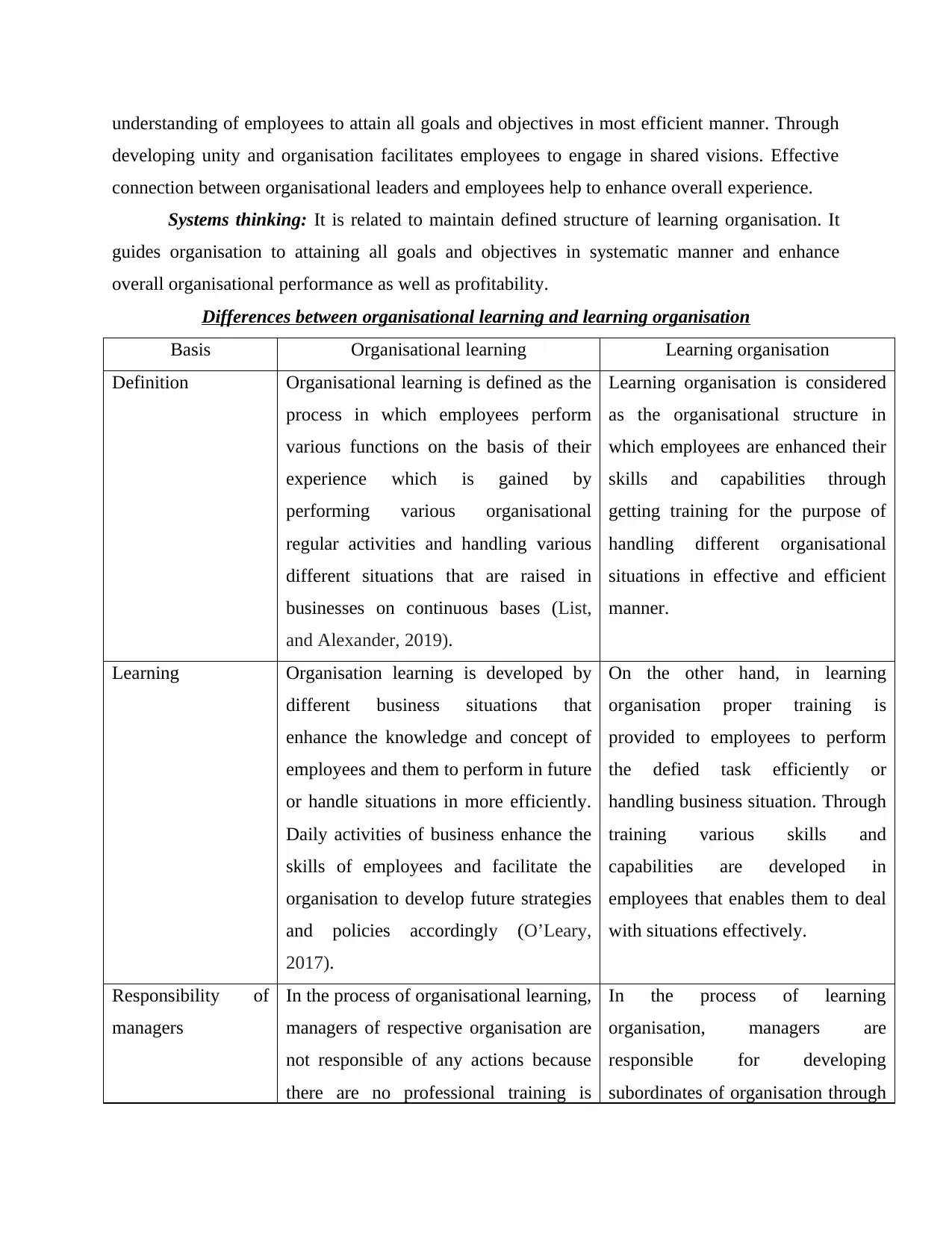
understanding of employees to attain all goals and objectives in most efficient manner. Through
developing unity and organisation facilitates employees to engage in shared visions. Effective
connection between organisational leaders and employees help to enhance overall experience.
Systems thinking: It is related to maintain defined structure of learning organisation. It
guides organisation to attaining all goals and objectives in systematic manner and enhance
overall organisational performance as well as profitability.
Differences between organisational learning and learning organisation
Basis Organisational learning Learning organisation
Definition Organisational learning is defined as the
process in which employees perform
various functions on the basis of their
experience which is gained by
performing various organisational
regular activities and handling various
different situations that are raised in
businesses on continuous bases (List,
and Alexander, 2019).
Learning organisation is considered
as the organisational structure in
which employees are enhanced their
skills and capabilities through
getting training for the purpose of
handling different organisational
situations in effective and efficient
manner.
Learning Organisation learning is developed by
different business situations that
enhance the knowledge and concept of
employees and them to perform in future
or handle situations in more efficiently.
Daily activities of business enhance the
skills of employees and facilitate the
organisation to develop future strategies
and policies accordingly (O’Leary,
2017).
On the other hand, in learning
organisation proper training is
provided to employees to perform
the defied task efficiently or
handling business situation. Through
training various skills and
capabilities are developed in
employees that enables them to deal
with situations effectively.
Responsibility of
managers
In the process of organisational learning,
managers of respective organisation are
not responsible of any actions because
there are no professional training is
In the process of learning
organisation, managers are
responsible for developing
subordinates of organisation through
developing unity and organisation facilitates employees to engage in shared visions. Effective
connection between organisational leaders and employees help to enhance overall experience.
Systems thinking: It is related to maintain defined structure of learning organisation. It
guides organisation to attaining all goals and objectives in systematic manner and enhance
overall organisational performance as well as profitability.
Differences between organisational learning and learning organisation
Basis Organisational learning Learning organisation
Definition Organisational learning is defined as the
process in which employees perform
various functions on the basis of their
experience which is gained by
performing various organisational
regular activities and handling various
different situations that are raised in
businesses on continuous bases (List,
and Alexander, 2019).
Learning organisation is considered
as the organisational structure in
which employees are enhanced their
skills and capabilities through
getting training for the purpose of
handling different organisational
situations in effective and efficient
manner.
Learning Organisation learning is developed by
different business situations that
enhance the knowledge and concept of
employees and them to perform in future
or handle situations in more efficiently.
Daily activities of business enhance the
skills of employees and facilitate the
organisation to develop future strategies
and policies accordingly (O’Leary,
2017).
On the other hand, in learning
organisation proper training is
provided to employees to perform
the defied task efficiently or
handling business situation. Through
training various skills and
capabilities are developed in
employees that enables them to deal
with situations effectively.
Responsibility of
managers
In the process of organisational learning,
managers of respective organisation are
not responsible of any actions because
there are no professional training is
In the process of learning
organisation, managers are
responsible for developing
subordinates of organisation through
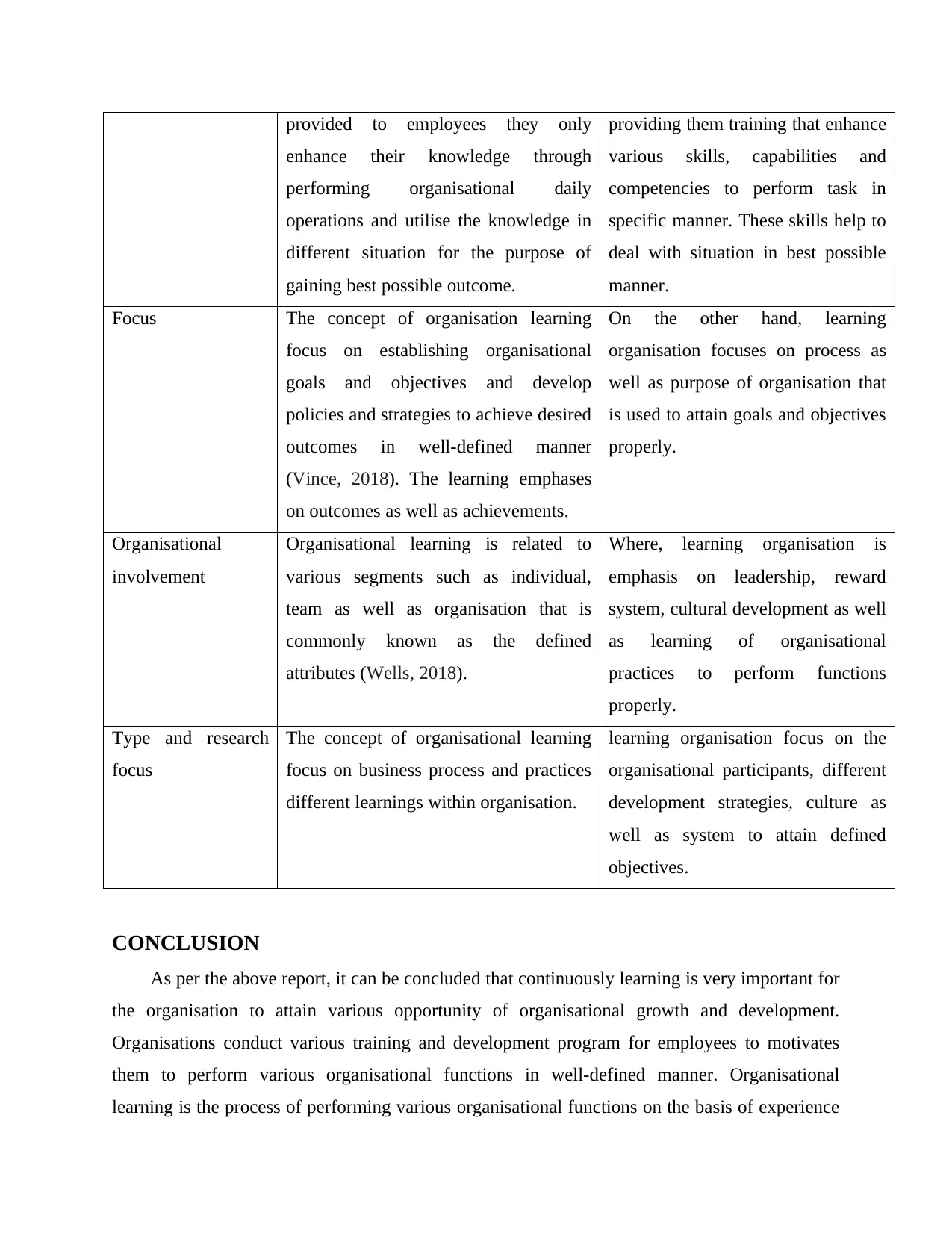
provided to employees they only
enhance their knowledge through
performing organisational daily
operations and utilise the knowledge in
different situation for the purpose of
gaining best possible outcome.
providing them training that enhance
various skills, capabilities and
competencies to perform task in
specific manner. These skills help to
deal with situation in best possible
manner.
Focus The concept of organisation learning
focus on establishing organisational
goals and objectives and develop
policies and strategies to achieve desired
outcomes in well-defined manner
(Vince, 2018). The learning emphases
on outcomes as well as achievements.
On the other hand, learning
organisation focuses on process as
well as purpose of organisation that
is used to attain goals and objectives
properly.
Organisational
involvement
Organisational learning is related to
various segments such as individual,
team as well as organisation that is
commonly known as the defined
attributes (Wells, 2018).
Where, learning organisation is
emphasis on leadership, reward
system, cultural development as well
as learning of organisational
practices to perform functions
properly.
Type and research
focus
The concept of organisational learning
focus on business process and practices
different learnings within organisation.
learning organisation focus on the
organisational participants, different
development strategies, culture as
well as system to attain defined
objectives.
CONCLUSION
As per the above report, it can be concluded that continuously learning is very important for
the organisation to attain various opportunity of organisational growth and development.
Organisations conduct various training and development program for employees to motivates
them to perform various organisational functions in well-defined manner. Organisational
learning is the process of performing various organisational functions on the basis of experience
enhance their knowledge through
performing organisational daily
operations and utilise the knowledge in
different situation for the purpose of
gaining best possible outcome.
providing them training that enhance
various skills, capabilities and
competencies to perform task in
specific manner. These skills help to
deal with situation in best possible
manner.
Focus The concept of organisation learning
focus on establishing organisational
goals and objectives and develop
policies and strategies to achieve desired
outcomes in well-defined manner
(Vince, 2018). The learning emphases
on outcomes as well as achievements.
On the other hand, learning
organisation focuses on process as
well as purpose of organisation that
is used to attain goals and objectives
properly.
Organisational
involvement
Organisational learning is related to
various segments such as individual,
team as well as organisation that is
commonly known as the defined
attributes (Wells, 2018).
Where, learning organisation is
emphasis on leadership, reward
system, cultural development as well
as learning of organisational
practices to perform functions
properly.
Type and research
focus
The concept of organisational learning
focus on business process and practices
different learnings within organisation.
learning organisation focus on the
organisational participants, different
development strategies, culture as
well as system to attain defined
objectives.
CONCLUSION
As per the above report, it can be concluded that continuously learning is very important for
the organisation to attain various opportunity of organisational growth and development.
Organisations conduct various training and development program for employees to motivates
them to perform various organisational functions in well-defined manner. Organisational
learning is the process of performing various organisational functions on the basis of experience
⊘ This is a preview!⊘
Do you want full access?
Subscribe today to unlock all pages.

Trusted by 1+ million students worldwide
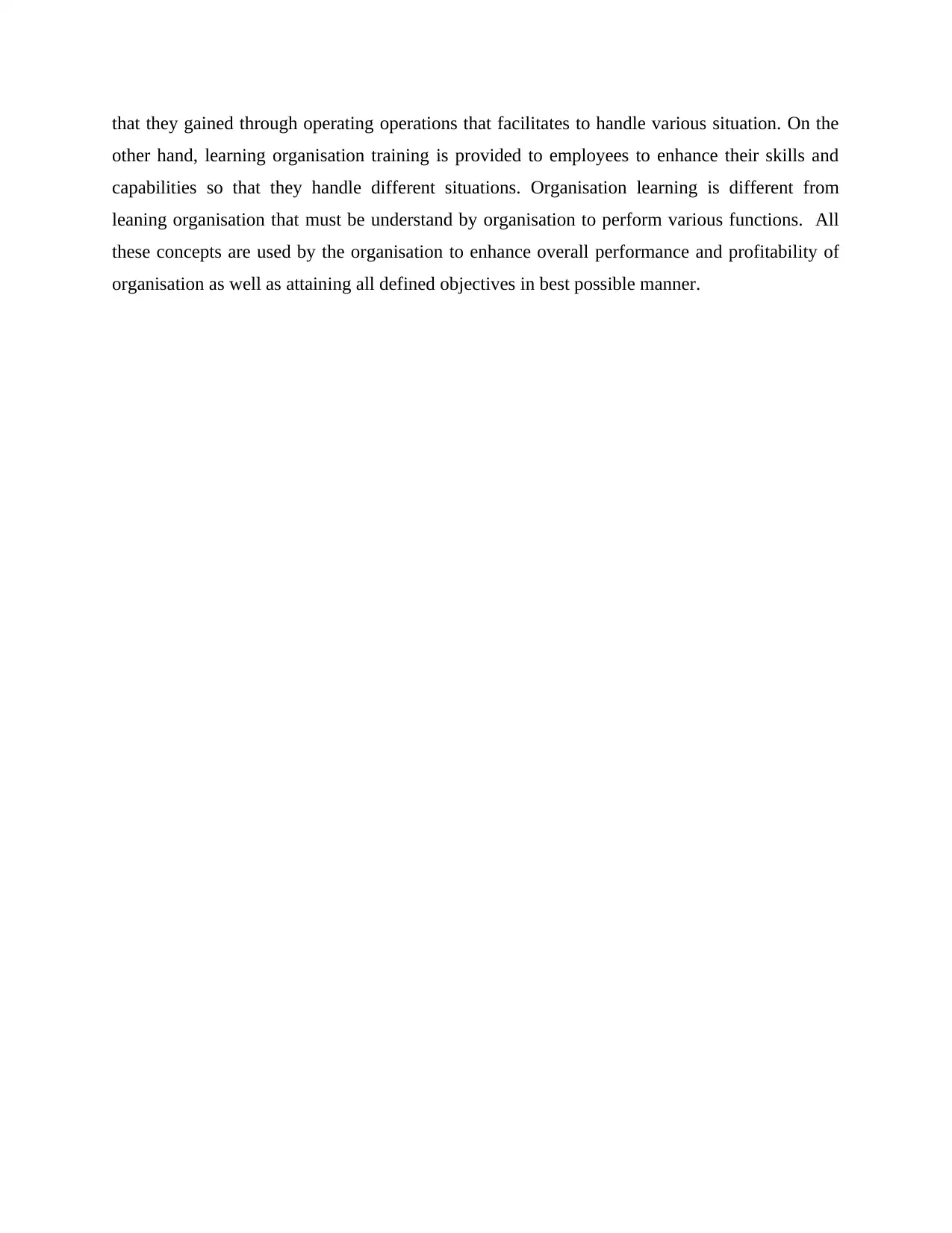
that they gained through operating operations that facilitates to handle various situation. On the
other hand, learning organisation training is provided to employees to enhance their skills and
capabilities so that they handle different situations. Organisation learning is different from
leaning organisation that must be understand by organisation to perform various functions. All
these concepts are used by the organisation to enhance overall performance and profitability of
organisation as well as attaining all defined objectives in best possible manner.
other hand, learning organisation training is provided to employees to enhance their skills and
capabilities so that they handle different situations. Organisation learning is different from
leaning organisation that must be understand by organisation to perform various functions. All
these concepts are used by the organisation to enhance overall performance and profitability of
organisation as well as attaining all defined objectives in best possible manner.
Paraphrase This Document
Need a fresh take? Get an instant paraphrase of this document with our AI Paraphraser
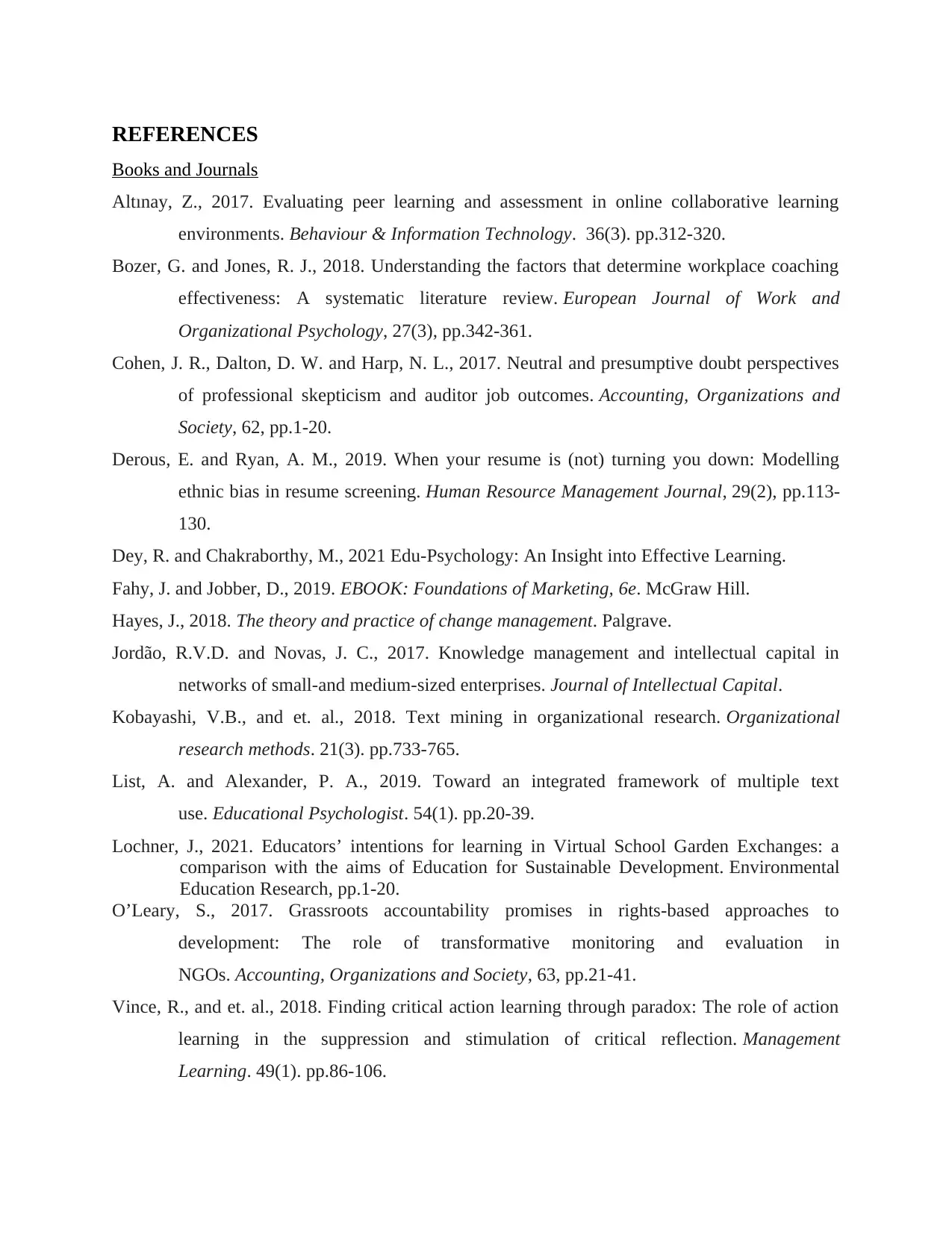
REFERENCES
Books and Journals
Altınay, Z., 2017. Evaluating peer learning and assessment in online collaborative learning
environments. Behaviour & Information Technology. 36(3). pp.312-320.
Bozer, G. and Jones, R. J., 2018. Understanding the factors that determine workplace coaching
effectiveness: A systematic literature review. European Journal of Work and
Organizational Psychology, 27(3), pp.342-361.
Cohen, J. R., Dalton, D. W. and Harp, N. L., 2017. Neutral and presumptive doubt perspectives
of professional skepticism and auditor job outcomes. Accounting, Organizations and
Society, 62, pp.1-20.
Derous, E. and Ryan, A. M., 2019. When your resume is (not) turning you down: Modelling
ethnic bias in resume screening. Human Resource Management Journal, 29(2), pp.113-
130.
Dey, R. and Chakraborthy, M., 2021 Edu-Psychology: An Insight into Effective Learning.
Fahy, J. and Jobber, D., 2019. EBOOK: Foundations of Marketing, 6e. McGraw Hill.
Hayes, J., 2018. The theory and practice of change management. Palgrave.
Jordão, R.V.D. and Novas, J. C., 2017. Knowledge management and intellectual capital in
networks of small-and medium-sized enterprises. Journal of Intellectual Capital.
Kobayashi, V.B., and et. al., 2018. Text mining in organizational research. Organizational
research methods. 21(3). pp.733-765.
List, A. and Alexander, P. A., 2019. Toward an integrated framework of multiple text
use. Educational Psychologist. 54(1). pp.20-39.
Lochner, J., 2021. Educators’ intentions for learning in Virtual School Garden Exchanges: a
comparison with the aims of Education for Sustainable Development. Environmental
Education Research, pp.1-20.
O’Leary, S., 2017. Grassroots accountability promises in rights-based approaches to
development: The role of transformative monitoring and evaluation in
NGOs. Accounting, Organizations and Society, 63, pp.21-41.
Vince, R., and et. al., 2018. Finding critical action learning through paradox: The role of action
learning in the suppression and stimulation of critical reflection. Management
Learning. 49(1). pp.86-106.
Books and Journals
Altınay, Z., 2017. Evaluating peer learning and assessment in online collaborative learning
environments. Behaviour & Information Technology. 36(3). pp.312-320.
Bozer, G. and Jones, R. J., 2018. Understanding the factors that determine workplace coaching
effectiveness: A systematic literature review. European Journal of Work and
Organizational Psychology, 27(3), pp.342-361.
Cohen, J. R., Dalton, D. W. and Harp, N. L., 2017. Neutral and presumptive doubt perspectives
of professional skepticism and auditor job outcomes. Accounting, Organizations and
Society, 62, pp.1-20.
Derous, E. and Ryan, A. M., 2019. When your resume is (not) turning you down: Modelling
ethnic bias in resume screening. Human Resource Management Journal, 29(2), pp.113-
130.
Dey, R. and Chakraborthy, M., 2021 Edu-Psychology: An Insight into Effective Learning.
Fahy, J. and Jobber, D., 2019. EBOOK: Foundations of Marketing, 6e. McGraw Hill.
Hayes, J., 2018. The theory and practice of change management. Palgrave.
Jordão, R.V.D. and Novas, J. C., 2017. Knowledge management and intellectual capital in
networks of small-and medium-sized enterprises. Journal of Intellectual Capital.
Kobayashi, V.B., and et. al., 2018. Text mining in organizational research. Organizational
research methods. 21(3). pp.733-765.
List, A. and Alexander, P. A., 2019. Toward an integrated framework of multiple text
use. Educational Psychologist. 54(1). pp.20-39.
Lochner, J., 2021. Educators’ intentions for learning in Virtual School Garden Exchanges: a
comparison with the aims of Education for Sustainable Development. Environmental
Education Research, pp.1-20.
O’Leary, S., 2017. Grassroots accountability promises in rights-based approaches to
development: The role of transformative monitoring and evaluation in
NGOs. Accounting, Organizations and Society, 63, pp.21-41.
Vince, R., and et. al., 2018. Finding critical action learning through paradox: The role of action
learning in the suppression and stimulation of critical reflection. Management
Learning. 49(1). pp.86-106.
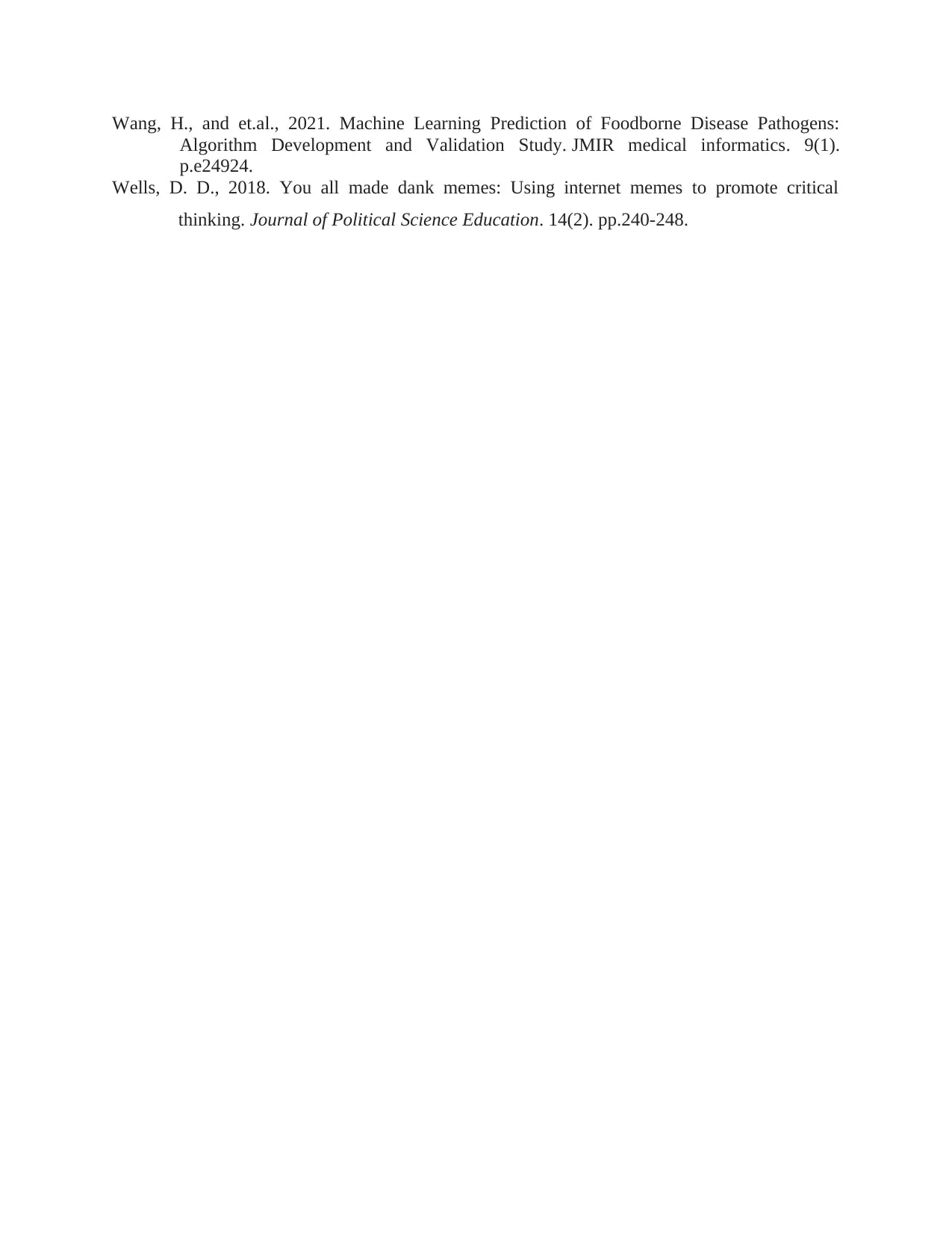
Wang, H., and et.al., 2021. Machine Learning Prediction of Foodborne Disease Pathogens:
Algorithm Development and Validation Study. JMIR medical informatics. 9(1).
p.e24924.
Wells, D. D., 2018. You all made dank memes: Using internet memes to promote critical
thinking. Journal of Political Science Education. 14(2). pp.240-248.
Algorithm Development and Validation Study. JMIR medical informatics. 9(1).
p.e24924.
Wells, D. D., 2018. You all made dank memes: Using internet memes to promote critical
thinking. Journal of Political Science Education. 14(2). pp.240-248.
⊘ This is a preview!⊘
Do you want full access?
Subscribe today to unlock all pages.

Trusted by 1+ million students worldwide
1 out of 13
Related Documents
Your All-in-One AI-Powered Toolkit for Academic Success.
+13062052269
info@desklib.com
Available 24*7 on WhatsApp / Email
![[object Object]](/_next/static/media/star-bottom.7253800d.svg)
Unlock your academic potential
Copyright © 2020–2026 A2Z Services. All Rights Reserved. Developed and managed by ZUCOL.


